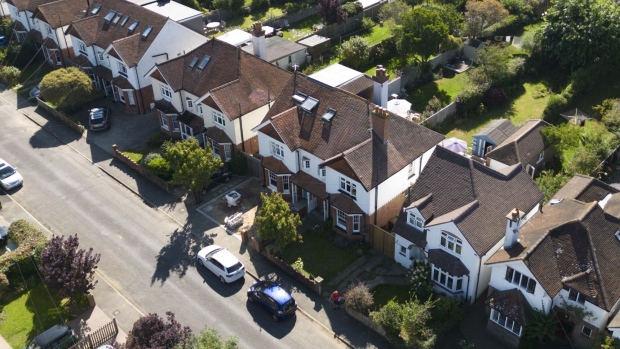May 7, 2024
UK House Prices Stagnate in April as Higher Mortgage Costs Bite
, Bloomberg News

(Bloomberg) -- UK house prices barely rose in April, according to Halifax, adding to evidence of a property market facing headwinds from rising mortgage rates.
They gained just 0.1% after a 0.9% drop in March, the mortgage lender said in a report on Tuesday. It left the average cost of a home at £288,949 ($362,330), which was 1.1% higher than a year earlier.
The figures come a week after rival lender Nationwide Building Society reported a second monthly decline in prices. Together, they suggest would-be buyers are feeling the pinch from costlier home loans as investors scale back bets on how far the Bank of England will cut interest rates.
“This reflects a housing market finding its feet in an era of higher interest rates,” said Amanda Bryden, head of mortgages at Halifax. “We can’t overlook the fact that affordability constraints are still a significant challenge, for both new buyers and those rolling off fixed-term deals.”
Halifax still expects property prices to “rise modestly over the course of 2024” and for mortgage rates to begin falling again if BOE rate cuts come into play.
The housing market had been showing signs of recovery after a slump last year triggered by a cost-of-living crisis and recession. But doubts are now emerging after lenders including Natwest, Santander and Nationwide increased mortgage rates in response to rising swap rates, which are used to set the bulk of mortgage products.
With house prices still historically high, the plight facing “generation rent” is set to feature at a general election expected later this year. The opposition Labour Party appears on track to return to power after Prime Minister Rishi Sunak’s Conservatives suffered devastating losses in local elections last week.
Borrowing costs for home loans have been pushed up by bets on the BOE delaying the start to interest-rate cuts until later this year. The average two-year fixed mortgage rate has climbed from around 5.5% in January to 5.93%, Moneyfacts said on Friday.
Traders, who had anticipated as many as six BOE cuts this year back in January, are now pricing in just two, the first of them coming in August. However, some economists expect the UK central bank to act sooner and deliver a bigger easing.
Halifax said its figures showed a “’North-South’ divide” in England in terms of annual house price performance.
Home valuations in London were largely flat compared to a year ago, up just 0.1%. Meanwhile the North West of England enjoyed a 3.3% rise, beaten only by Northern Ireland where prices increased 3.4%.
“As the prospect of the first rate cut since March 2020 drifts further into the distance, borrowing costs have edged higher and budgets have been squeezed,” said Tom Bill, head of UK residential research at Knight Frank.
He said prices were also being held back by “a short-lived burst of positivity in the early weeks of this year” leading to more homes coming onto the market.
©2024 Bloomberg L.P.






